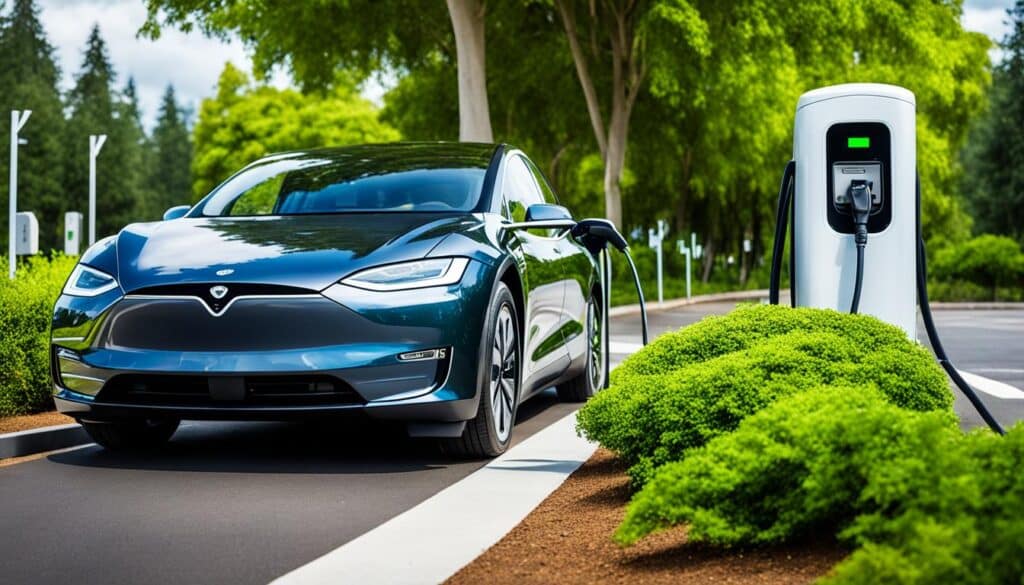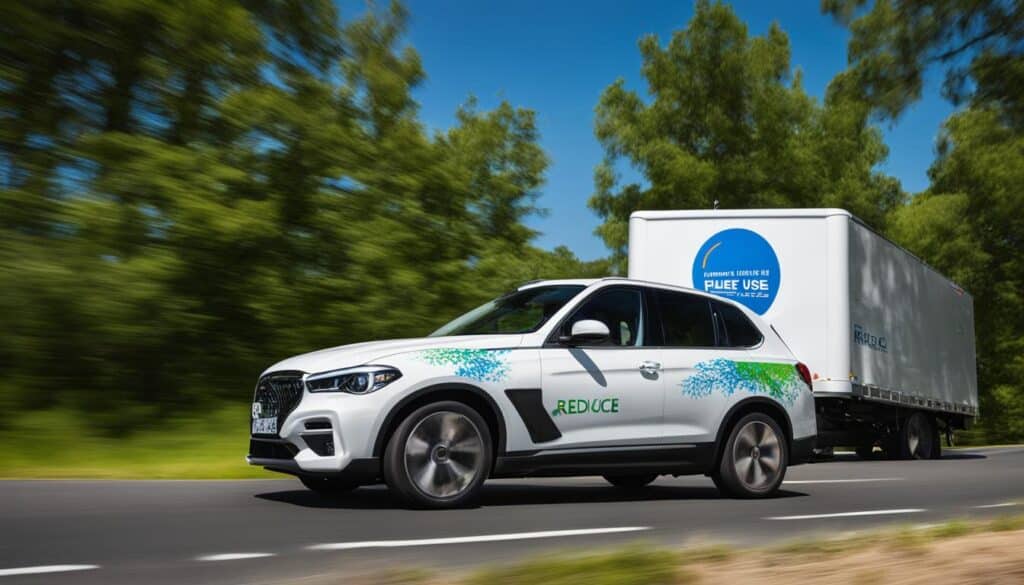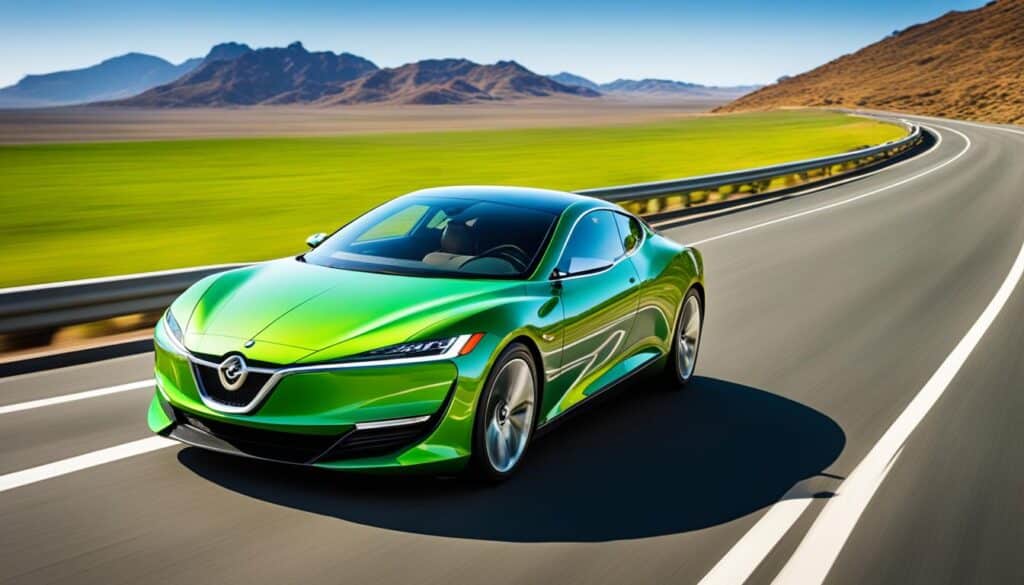Hello, I’m here to share valuable information about vehicle fuel efficiency in New Zealand. Whether you’re interested in saving money or reducing carbon emissions, optimizing your vehicle’s fuel efficiency is paramount. With the increasing emphasis on eco-friendly practices and sustainable transportation, fuel-efficient vehicles have become a popular choice for conscientious drivers.
By adopting green driving habits and selecting economical vehicles, you can make a significant impact on the environment while enjoying the benefits of reduced fuel consumption. Let’s explore the various ways you can maximize your drive with vehicle fuel efficiency in NZ.
Key Takeaways:
- Choosing fuel-efficient cars can save you money and reduce carbon emissions.
- Implementing fuel-saving techniques like smooth driving and proper gear changes can significantly impact fuel efficiency.
- Exploring alternative transportation options such as ride sharing, walking, cycling, and public transport can help reduce fuel consumption.
- Mindful driving practices, such as slow acceleration and coasting to decelerate, can save petrol and improve fuel economy.
- Proper vehicle maintenance is crucial for maximizing fuel efficiency and reducing fuel use and pollutants.
Tips to Improve Fuel Efficiency
Improving your vehicle’s fuel efficiency plays a vital role in reducing fuel use and emissions. By following these simple yet effective tips, you can maximize your vehicle fuel efficiency in New Zealand:
- Drive Smoothly: Avoid rapid accelerations and sharp braking, as they can significantly increase fuel consumption and emissions.
- Optimize Gear Changes: Change gears at the appropriate time to avoid over-revving, thereby improving fuel efficiency.
- Reduce Short Trips: Combine your errands and plan your trips efficiently to minimize short-distance driving, as cold starts consume more fuel.
- Reduce Speed: Driving at appropriate speeds not only enhances road safety but also improves fuel efficiency by reducing aerodynamic drag.
- Avoid Excessive Idling: Turn off your engine if you anticipate a stop longer than a minute, as idling consumes unnecessary fuel and emits pollutants.
- Avoid Unnecessary Loads: Remove any unnecessary items from your vehicle, as additional weight leads to increased fuel consumption.
- Use Air Conditioning Wisely: Air conditioning significantly impacts fuel efficiency. Use it sparingly and consider using the vehicle’s ventilation system when possible.
- Choose the Right-Sized Vehicle: Select a vehicle that suits your needs to avoid unnecessary fuel consumption caused by an oversized or underutilized vehicle.
- Maintain Proper Tyre Pressure: Regularly check and maintain the recommended tyre pressure to minimize rolling resistance and improve fuel efficiency.
“Driving smoothly and maintaining the optimal speed not only saves fuel but also contributes to a more relaxing and enjoyable driving experience.”
Implementing these tips can help you achieve better vehicle fuel efficiency, reduce fuel use, and lower emissions. By taking small steps, you can make a significant impact on your driving habits and the environment.
Choosing a Fuel-Efficient Vehicle
When it comes to maximizing fuel efficiency, choosing the right vehicle plays a crucial role. By opting for a fuel-efficient vehicle, you can save money on fuel costs and reduce your carbon dioxide emissions. One of the best options to consider is electric vehicles (EVs), which offer excellent fuel efficiency while reducing reliance on fossil fuels.
Not sure where to start? Look for the fuel economy label on vehicles, which provides important information about a car’s fuel efficiency. It includes details on the estimated annual fuel costs, fuel consumption, and CO2 emissions. You can use this label to compare different vehicles and make an informed decision.
Another resource to consider is Rightcar, a website that offers comprehensive information about fuel economy and safety ratings for a wide range of vehicles. This will help you compare and select a vehicle that meets your needs while prioritizing fuel efficiency and safety.
While fuel efficiency is important, it’s also crucial to consider vehicle safety features when making your selection. Look for features such as advanced driver assistance systems (ADAS), collision avoidance systems, and other technologies that prioritize your safety on the road.
Remember, choosing a fuel-efficient vehicle not only saves you money but also contributes to reducing CO2 emissions, making a positive impact on the environment. So, make an eco-conscious choice and embrace the benefits of fuel-efficient driving.

| Benefits of Choosing a Fuel-Efficient Vehicle | Benefits of Electric Vehicles (EVs) |
|---|---|
|
|
Basic Vehicle Maintenance for Fuel Efficiency
Proper vehicle maintenance is essential when it comes to maximizing fuel efficiency and reducing your vehicle’s impact on the environment. By regularly performing basic maintenance tasks, you can minimize fuel use, decrease pollutants, and ensure optimal performance. Here are some essential vehicle maintenance practices to prioritize:
Tuning for Optimal Performance
Regular vehicle tuning improves fuel efficiency by ensuring that all components, such as the engine, filters, and sensors, are functioning optimally. This helps reduce fuel consumption and emissions.
Tire Maintenance for Better Fuel Efficiency
Keeping your tires in good condition and maintaining the recommended tire pressure is crucial for fuel efficiency. Properly inflated tires experience less rolling resistance, resulting in improved fuel economy.
Lighting and Brake Maintenance for Safety and Efficiency
Regularly checking and maintaining your vehicle’s lighting and brake systems is not only crucial for safety but also enhances fuel efficiency. Properly functioning lights and brakes help reduce unnecessary energy consumption.
Removing Air Resistance for Improved Aerodynamics
Reducing air resistance by removing excess luggage racks, roof boxes, or other attachments when not needed can improve your vehicle’s aerodynamics. This, in turn, enhances fuel efficiency by reducing drag.
Maintenance of Safety Features for Optimal Performance
Keeping your vehicle’s safety features, such as airbags, seat belts, and anti-lock braking systems (ABS), well maintained is essential. Properly functioning safety features not only ensure your safety but also contribute to optimal vehicle performance and fuel efficiency.
Remember, proper vehicle maintenance not only helps improve fuel efficiency but also extends the lifespan of your car, saving you money in the long run.
By incorporating these maintenance practices into your routine, you can contribute to a greener and more efficient driving experience while reducing your environmental impact.
| Vehicle Maintenance Tips | Benefits |
|---|---|
| Regular vehicle tuning | Optimizes fuel efficiency and reduces emissions |
| Tire maintenance | Improves fuel economy by reducing rolling resistance |
| Lighting and brake maintenance | Enhances safety and reduces energy consumption |
| Removing air resistance | Improves aerodynamics and reduces drag |
| Safety features maintenance | Ensures optimal performance and fuel efficiency |
Alternative Transportation Options
Reducing fuel use is a key step in achieving sustainable transportation. By exploring alternative transportation options, you can significantly lower your fuel consumption and contribute to a greener environment by reducing carbon emissions. Here are some alternative transportation methods to consider:
- Ride sharing: Sharing rides with others going in the same direction not only reduces fuel use but also helps in minimizing traffic congestion. Popular ride-sharing services like Uber and Lyft are convenient options to consider.
- Walking: Walking short distances is not only good for your health but also helps you reduce your carbon footprint. By choosing to walk instead of driving, you can save fuel and contribute to cleaner air in your community.
- Cycling: Cycling is another eco-friendly transportation option that promotes personal fitness while reducing fuel consumption. Consider using a bicycle for short commutes or leisurely rides.
- Public transport: Utilizing public transport, such as buses, trains, or trams, is an effective way to reduce fuel use and lower carbon emissions. Public transport networks are well-developed in urban areas and offer a convenient and sustainable alternative to driving.
By planning your trips to include these alternative transportation options whenever possible, you can make a significant impact in reducing fuel use and promoting sustainable transportation in your community.

Benefits of Alternative Transportation
Choosing alternative transportation methods not only helps in reducing fuel use but also offers several other benefits:
- Cost savings: Using alternative transportation methods, such as ride-sharing or public transport, can help you save money on fuel costs, parking fees, and car maintenance expenses.
- Improved health: Walking or cycling as a means of transportation boosts your physical fitness levels and contributes to a healthier lifestyle.
- Reduced traffic congestion: By opting for alternative transportation options, you can help alleviate traffic congestion and reduce travel times for everyone.
- Environmental sustainability: Choosing sustainable transportation methods significantly reduces carbon emissions, helping to combat climate change and preserve the environment.
By embracing alternative transportation options, you can make a positive impact on reducing fuel use and fostering a sustainable future.
| Transportation Method | Benefits |
|---|---|
| Ride sharing | – Reduces fuel consumption – Minimizes traffic congestion – Cost-effective |
| Walking | – Promotes personal health – Reduces carbon footprint |
| Cycling | – Eco-friendly – Enhances personal fitness – Reduces fuel use |
| Public transport | – Lowers fuel consumption – Reduces carbon emissions – Cost-effective |
Mindful Driving Practices
When it comes to maximizing fuel efficiency and saving petrol, adopting mindful driving practices can make a significant difference. By implementing these fuel-efficient driving techniques, you can reduce fuel consumption and contribute to a more sustainable transportation system. Let’s explore some key practices that can help you achieve fuel efficiency:
1. Slow Acceleration
Start your journey with a slow and gradual acceleration. By avoiding rapid acceleration, you can conserve fuel and optimize your vehicle’s performance. Smoothly pressing on the accelerator pedal and allowing your vehicle to reach a steady speed will lead to better fuel economy.
2. Maintain Steady Speed
Driving at a steady speed within the optimal fuel economy range can save significant amounts of petrol. Avoid unnecessary speed fluctuations and use cruise control when possible to maintain a consistent speed. This reduces fuel consumption and supports eco-friendly driving.
3. Scan Traffic Ahead
Keep a vigilant eye on the road ahead and anticipate traffic flow. By scanning the traffic, you can adjust your driving accordingly, avoiding sudden braking or acceleration that can waste fuel. Anticipating traffic patterns allows for a smoother driving experience and better fuel efficiency.
4. Coasting to Decelerate
Instead of relying heavily on the brakes to decelerate, utilize coasting whenever possible. When you see a stop sign or traffic signal ahead, release the accelerator pedal in advance and let the vehicle naturally slow down. This practice reduces fuel consumption and prolongs the life of your brake pads and discs.
Implementing these mindful driving practices will lead to optimal fuel efficiency, reduced reliance on petrol, and a positive impact on the environment. By driving mindfully, you can contribute to a greener future while enjoying a smoother and more efficient driving experience.
Conclusion
Maximizing your vehicle fuel efficiency in New Zealand is crucial for both cost-effective and eco-friendly driving. By implementing the tips mentioned, choosing a fuel-efficient vehicle, maintaining your vehicle properly, considering alternative transportation options, and practicing mindful driving, you can significantly reduce your fuel consumption, lower carbon emissions, and contribute to sustainable transportation.
Vehicle Fuel Efficiency NZ plays a pivotal role in promoting fuel efficiency awareness and providing resources to help individuals make informed decisions. By embracing fuel efficiency, not only can you save money, but you can also help protect the environment for future generations.
Remember, fuel efficient driving is not just about personal benefits but also about creating a cleaner and greener New Zealand. By adopting sustainable transportation practices, we can collectively make a positive impact, reducing our carbon footprint and creating a more eco-conscious society.
FAQ
Why is vehicle fuel efficiency important in New Zealand?
Vehicle fuel efficiency is important in New Zealand because transport accounts for a significant portion of energy use and carbon dioxide emissions. Optimizing fuel efficiency helps reduce carbon emissions, save money, and contribute to sustainable transportation.
What are some tips to improve fuel efficiency?
Some tips to improve fuel efficiency include driving smoothly by avoiding rapid acceleration and sharp braking, changing gears optimally, reducing short trips, driving at appropriate speeds, minimizing idling periods, avoiding unnecessary loads, using air conditioning wisely, choosing the right-sized vehicle, and maintaining proper tyre pressure.
How can I choose a fuel-efficient vehicle?
When choosing a fuel-efficient vehicle, consider exploring electric vehicles, which offer excellent fuel efficiency. You can also refer to fuel economy labels and websites like Rightcar to compare the fuel efficiency of different vehicles. Additionally, don’t forget to consider safety features when purchasing a vehicle.
How does basic vehicle maintenance affect fuel efficiency?
Basic vehicle maintenance plays a crucial role in maximizing fuel efficiency. Regular vehicle tuning, maintaining correct tyre pressure, ensuring proper lighting and brake function, and removing unnecessary air resistance can reduce fuel use and emissions. It is also important to maintain the safety features of your vehicle to ensure optimal performance.
What are some alternative transportation options to reduce fuel use?
To reduce fuel use, you can explore alternative transportation options such as ride sharing, walking, cycling, and using public transport. Combining these methods with driving can significantly lower fuel consumption and contribute to a greener environment by reducing carbon emissions.
What are some mindful driving practices to save fuel?
Mindful driving practices include accelerating slowly, maintaining a steady speed within the optimal fuel economy range, scanning the road ahead to anticipate traffic flow, and coasting to decelerate instead of relying on the brakes. Implementing these fuel-efficient driving practices can help you achieve better fuel economy and reduce your fuel consumption.




